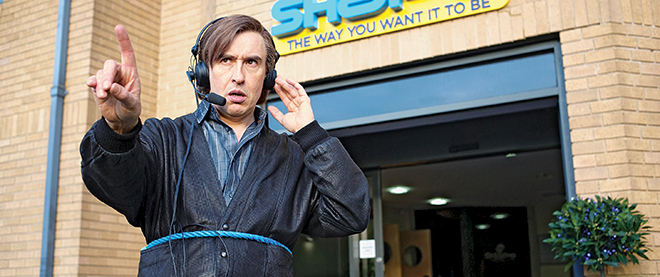Steve Coogan: British comedy’s secret weapon
He inspired Ricky Gervais, now he’s waiting for his close-up
Nicola Dove/StudioCanal
Share

Question: What British comedian became famous for pioneering a TV comedy role as a pompous ass who mistreats his colleagues and inflates his petty status with delusions of grandeur? Obvious. That would be Ricky Gervais, star and co-creator of The Office, the original U.K. version. But ask a Brit and the answer might just as easily be Steve Coogan. Long before Gervais scored his breakthrough, Coogan blazed remarkably similar terrain in the 1990s with a string of popular BBC radio and TV sitcoms—as Alan Partridge, a fictional radio and TV host. The parallels are so striking, it seems impossible Gervais didn’t fall under the influence of Coogan’s comic genius. But while the success of The Office, and its U.S. remake, catapulted Gervais to stardom, Coogan remains largely unknown beyond the U.K, where he is a household name. Gervais, 52, went on to cement his celebrity as an abrasive host at the Golden Globe Awards, as Coogan, 47, continued to milk his Partridge role as a fake abrasive host for a knowing but insular audience of Brits.
Yet Coogan is the more versatile actor, adept at spinning his showbiz neuroses into comic gold—most explicitly in Michael Winterbottom’s cult hit The Trip (2010). In this priceless mockumentary, Coogan and his pal Rob Brydon play themselves, as fiercely competitive comics who do duelling impressions of Michael Caine and Sean Connery while touring English gastro-pubs. “It’s a caricature of myself,” says Coogan, on the phone from Manchester. “Those things that are unattractive—insecurity, pretentiousness, moralizing—all I do is turn the volume up to 11.”
Winterbottom, who has made five movies with Coogan, says, “He’s always played a version of himself, or at least the public persona of Steve Coogan.” It’s a self-conscious tangle of vanity, insecurity and spite—akin to Gervais’s persona, but nuanced. “The difference between the real Steve and the fictional Steve is he’s aware of all that and bravely willing to make fun of it,” adds the director, who’s on the line from Italy, where he and Coogan have just shot a sequel to The Trip. “I’m sure Ricky Gervais did borrow from Steve, but there’s a whole generation of British comedians who all borrowed from each other.”
In Winterbottom’s latest movie, The Look of Love, Coogan stars as swinging-’60s porn king Paul Raymond, who’s like a sad flipside of Partridge, a hustler warped by success instead of failure. He floats through a haze of sex and cocaine, which carries a whiff of the actor’s own playboy past: Coogan’s ex-lover Courtney Love blamed him for drawing actor Owen Wilson into a spiral of hard living that led to Wilson’s 2007 suicide attempt.
Coogan has flirted with Hollywood, from small roles in blockbuster movies to a turn as Larry David’s therapist on Curb Your Enthusiasm. But he looks back on L.A. as a bad trip: “I did films that I would never go and see, frankly—Night at the Museum and Tropic Thunder. When I came to L.A. an agent said, ‘If you want to be famous, do the same thing over and over again, so people know exactly who you are.’ I don’t want to be that person.” But he admits he’s done that in Britain with his signature role (“Alan Partridge is my bête noire”), which finally comes to the big screen next month in Alan Partridge: Alpha Papa. It’s telling that the movie has no North American distributor. While waiting for America to discover him, Coogan has watched Hollywood absorb some of his concepts, and at least one of his cohorts—Alan Partridge writer and producer Armando Iannucci created HBO’s Veep, another satirical series about a desperate ego.
But Coogan is not wedded to comedy: “Michael Winterbottom liberated me from the security blanket of laughter,” he says. And this fall he co-stars with Judi Dench in Stephen Frears’s Philomena, as former BBC journalist Martin Sixsmith, who helps a woman find an adult son she gave up for adoption. Coogan co-wrote and co-produced the drama, which Oscar-mad mogul Harvey Weinstein snapped up in Cannes for $6.5 million. “It’s a serious, cathartic piece of work that is completely personal for me,” says Coogan. With any luck, by sidestepping comedy, he could make his belated breakthrough with a feat that has eluded Gervais: maturity.